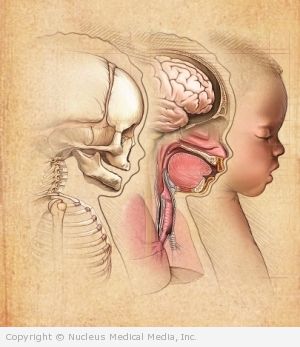Asperger Syndrome
(Asperger Disorder)
Asperger syndrome – Definition
Asperger syndrome is a pervasive developmental disorders resulting in social and behavioral problems. Autism is another condition in this category. Asperger syndrome is viewed by some scientists as a distinct disease; others see it as a less severe type of autism. Children with Asperger syndrome usually have normal intelligence and do not have the language problems typical of autism.
Asperger syndrome – Causes
The cause of Asperger syndrome is unknown. Some experts believe a variety of factors may be responsible for the faulty brain development.
Asperger syndrome – Risk Factors
Asperger syndrome is more common in boys. Family history of autism spectrum disorder may also be a risk factor.
Asperger syndrome – Symptoms
Symptoms usually become noticeable around 2-½ or 3 years of age. Symptoms may range from mild to severe and can include:
- Difficulty interacting with others
- Trouble making friends
- Poor understanding of other people’s feelings
- Insensitivity to social cues and facial expressions
- Inappropriate social and emotional responses
- Preoccupation with one’s own world
- Not sharing enjoyment, interests, or achievements with others
- Following repetitive routines or rituals
- Difficulty with any changes in routine or schedule
- Single mindedness
- Limited interests, usually one or two subjects
- Repeating words or phrases over and over
- Intense interest in a few topics
- Good rote memory without understanding the information
- Limited verbal skills or using words in odd ways
- Difficulty imagining things or thinking abstractly
- Taking things very literally
- Focusing on small details and having trouble seeing the bigger picture
- Ability to read without understanding the words
- Problems with nonverbal communication
- Poor eye contact
- Few facial expressions, except for anger or unhappiness
- Impaired body posturing or use of gestures
- Clumsy movements
- Hand flapping
- Poor coordination
- Inflexibility or trouble accepting change
- Difficulty accepting loss or criticism
- Obsessive desire to finish any tasks that are started
Asperger syndrome – Diagnosis
There are no tests for Asperger syndrome. The diagnosis is based on observations of the child’s behavior. Neuropsychological and IQ tests may be given. Medical tests may be ordered to help rule out other conditions. Children and their families can benefit from early intervention. Knowing what is wrong also helps families understand why the child acts differently than other children.
Asperger syndrome – Treatment
There is no treatment to cure Asperger syndrome. Treatments aim to control symptoms and improve social skills. Patients often learn to function independently as adults. However, they usually continue to experience problems with social interaction. They may be at risk for learning disabilities, such as attention deficit disorder (ADD). They also may develop mental health problems, such as depression and anxiety. Children with Asperger syndrome need love and understanding, as well as a structured schedule.
Medication
Drugs to help control symptoms may include:
- Stimulants
- Mood-altering drugs
- Drugs to control seizures
- Serotonin selective reuptake inhibitors (SSRIs) — such as citalopram (eg, Celexa), sertraline (eg, Zoloft), fluoxetine (eg, Prozac)
- Neuroleptics — such as risperidone (eg, Risperdal)
Alternative Therapies
The supplement melatonin may be helpful in improving sleep. But, talk to the doctor before giving herbs or supplements to your child.
Counseling
Behavior modification therapy and training can help children develop social skills. Learning how to make and keep friends is a challenge for children with Asperger syndrome.
Family Care
Caring for a child with Asperger syndrome can be very stressful. Counselors help parents learn how to manage the child’s behavior. Suggestions include:
- Give warnings that an activity is about to end and provide ways to “save” the task for later. For instance, a favorite television show may be recorded for later viewing.
- Try to incorporate some flexibility into the day.
- Set limits on the amount of time the child can spend on a single, obsessive activity.
- Keep directions simple.
- Use precise words.
- Limit choices to two or three things.
- Avoid using figures of speech.
- Make lists.
- Do not assume a child with this disorder understands what has been said simply because he can repeat it back to you.
- Start explaining at an early age what is appropriate behavior for public and private places.
- Do not make idle threats or promises.
- Give praise for accomplishments, especially social skills.
Educational Needs
Children with Asperger syndrome usually have a normal IQ but have special educational needs. They often can attend regular schools. They may need extra support in the classroom. Special attention should be paid to building social skills. Teachers should be informed of the child’s needs. Children with Asperger syndrome may be teased or bullied because they seem different.
Asperger syndrome – Prevention
There are no guidelines for preventing Asperger syndrome.

